| Listing 1 - 10 of 17 | << page >> |
Sort by
|
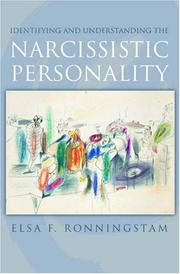
ISBN: 1280481889 0198033966 1423720075 9780198033967 9781423720072 9781280481888 9786610481880 6610481881 0195148738 9780195148732 0199882010 0197735770 Year: 2005 Publisher: New York : Oxford University Press,
Abstract | Keywords | Export | Availability | Bookmark
 Loading...
Loading...Choose an application
- Reference Manager
- EndNote
- RefWorks (Direct export to RefWorks)
Elsa Ronningstam presents a balanced, comprehensive and up-to-date review of our understanding of narcissistic personality disorder, explaining the range from personality trait, which can be productive, to full-blown disorder, which can be highly destructive.
Narcissism. --- Ego erotism --- Erotism, Ego --- Narcism --- Egoism --- Psychology, Pathological --- Identité collective --- Narcissisme --- Personnalité --- Théorie psychanalytique --- Trouble psychopathologique
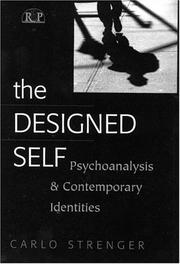
ISBN: 0203780612 1134912668 9781134912667 9780203780619 0881634190 9780881634198 9781134912735 9781134912803 9781138009882 1134912730 Year: 2005 Publisher: Hillsdale, NJ Analytic Press
Abstract | Keywords | Export | Availability | Bookmark
 Loading...
Loading...Choose an application
- Reference Manager
- EndNote
- RefWorks (Direct export to RefWorks)
What can contemporary psychoanalysis bring to the understanding of Generation X, a cohort for whom the trivialization of a dizzying array of possible experiences teamed with the pressure to lead spectacular lives often leads to diffuse feelings of confusion, depression, and disorientation. The Designed Self chronicles Strenger's therapeutic encounters with five extraordinarily gifted young adults for whom the ideal of authenticity long associated with the Baby-Boom generation was supplanted by the need to experiment endlessly with the self. Perpetual self-experimentation, constantly r
Identity (Psychology) --- Psychoanalysis. --- Psychoanalysis --- Personal identity --- Personality --- Self --- Ego (Psychology) --- Individuality --- Psychology --- Psychology, Pathological
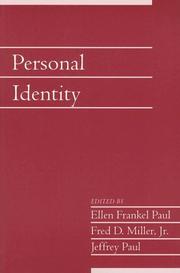
ISBN: 0511759347 0521617677 Year: 2005 Publisher: Cambridge : Cambridge University Press,
Abstract | Keywords | Export | Availability | Bookmark
 Loading...
Loading...Choose an application
- Reference Manager
- EndNote
- RefWorks (Direct export to RefWorks)
What is a person? What makes me the same person today that I was yesterday or will be tomorrow? Philosophers have long pondered these questions. In Plato's Symposium, Socrates observed that all of us are constantly undergoing change: we experience physical changes to our bodies, as well as changes in our 'manners, customs, opinions, desires, pleasures, pains, [and] fears'. Aristotle theorized that there must be some underlying 'substratum' that remains the same even as we undergo these changes. John Locke rejected Aristotle's view and reformulated the problem of personal identity in his own way: is a person a physical organism that persists through time, or is a person identified by the persistence of psychological states, by memory? These essays - written by prominent philosophers and legal and economic theorists - offer valuable insights into the nature of personal identity and its implications for morality and public policy.
Self (Philosophy) --- Identity (Psychology) --- Philosophy --- Philosophy & Religion --- Speculative Philosophy --- Personal identity --- Personality --- Self --- Ego (Psychology) --- Individuality
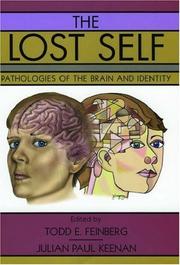
ISBN: 0195173414 9780195173413 Year: 2005 Publisher: Oxford : Oxford university press,
Abstract | Keywords | Export | Availability | Bookmark
 Loading...
Loading...Choose an application
- Reference Manager
- EndNote
- RefWorks (Direct export to RefWorks)
Brain --- Cognitive neuroscience. --- Depersonalization. --- Ego. --- Identity (Psychology). --- Mental Disorders --- Self. --- physiopathology. --- physiopathology.
Book
Year: 2005 Publisher: [s.l.] : Publications Kunchab,
Abstract | Keywords | Export | Availability | Bookmark
 Loading...
Loading...Choose an application
- Reference Manager
- EndNote
- RefWorks (Direct export to RefWorks)
Self (Philosophy) --- Ego (Psychology) --- Moi (Philosophie) --- Moi (Psychologie) --- Religious aspects --- Buddhism, [Christianity, etc.] --- Aspect religieux --- Bouddhisme, [Christianisme, etc.]
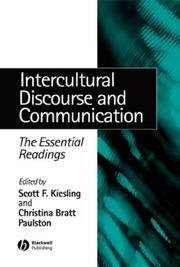
ISBN: 0631235442 0631235434 9780631235446 9780631235439 Year: 2005 Publisher: Malden, Mass. Blackwell
Abstract | Keywords | Export | Availability | Bookmark
 Loading...
Loading...Choose an application
- Reference Manager
- EndNote
- RefWorks (Direct export to RefWorks)
Pragmatics --- Sociology of culture --- Intercultural communication --- Identity (Psychology) --- Intercultural communication. --- Discourse analysis. --- Personal identity --- Personality --- Self --- Ego (Psychology) --- Individuality --- Cross-cultural communication --- Communication --- Culture --- Cross-cultural orientation --- Cultural competence --- Multilingual communication --- Technical assistance --- Anthropological aspects
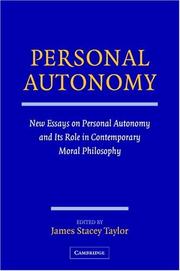
ISBN: 0521837960 0521732344 1107139872 0511171129 051108224X 0511298269 0511614195 1280415762 0511196792 0511081790 9780511082245 9780511614194 9780521837965 9781280415760 Year: 2005 Publisher: Cambridge, UK New York
Abstract | Keywords | Export | Availability | Bookmark
 Loading...
Loading...Choose an application
- Reference Manager
- EndNote
- RefWorks (Direct export to RefWorks)
Autonomy has recently become one of the central concepts in contemporary moral philosophy and has generated much debate over its nature and value. This 2005 volume brings together essays that address the theoretical foundations of the concept of autonomy, as well as essays that investigate the relationship between autonomy and moral responsibility, freedom, political philosophy, and medical ethics. Written by some of the most prominent philosophers working in these areas, this book represents research on the nature and value of autonomy that will be essential reading for a broad swathe of philosophers as well as many psychologists.
General ethics --- Ethics, Modern. --- Autonomy (Psychology) --- Ethics, Modern --- Modern ethics --- Freedom (Psychology) --- Independence (Psychology) --- Self-determination (Psychology) --- Self-direction (Psychology) --- Dependency (Psychology) --- Ego (Psychology) --- Emotions --- Arts and Humanities --- Philosophy

ISBN: 2220055701 9782220055701 Year: 2005 Publisher: Paris Desclée De Brouwer
Abstract | Keywords | Export | Availability | Bookmark
 Loading...
Loading...Choose an application
- Reference Manager
- EndNote
- RefWorks (Direct export to RefWorks)
Christianity --- Identity (Psychology) --- History. --- Religious aspects --- Christianity. --- Personal identity --- Personality --- Self --- Ego (Psychology) --- Individuality --- Religions --- Church history --- History --- Religious aspects&delete& --- Europe --- Church history. --- Christianity - Europe - History. --- Identity (Psychology) - Religious aspects - Christianity.
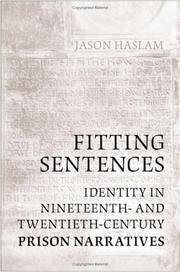
ISBN: 1282023535 9786612023538 1442674946 9781442674943 0802038336 9780802038333 Year: 2005 Publisher: Toronto
Abstract | Keywords | Export | Availability | Bookmark
 Loading...
Loading...Choose an application
- Reference Manager
- EndNote
- RefWorks (Direct export to RefWorks)
"Fitting Sentences is an analysis of writings by prisoners from nineteenth- and twentieth-century North America, South Africa, and Europe. Jason Haslam examines the ways in which these writers reconfigure subjectivity and its relationship with social power structures, especially the prison itself, while also detailing the relationship between prison and slave narratives. Specifically, Haslam reads texts by Henry David Thoreau, Harriet Jacobs, Oscar Wilde, Martin Luther King, Jr, Constance Lytton, and Breyten Breytenbach to find the commonalities and divergences in their stories."--Jacket.
Prisoners' writings --- Identity (Psychology) --- Imprisonment --- Writings of prisoners --- Literature --- Confinement --- Incarceration --- Corrections --- Detention of persons --- Punishment --- Prison-industrial complex --- Prisons --- Personal identity --- Personality --- Self --- Ego (Psychology) --- Individuality --- History and criticism. --- History --- School-to-prison pipeline
Book
ISBN: 843396223X 9788433962232 Year: 2005 Volume: 328 Publisher: Barcelona Anagrama
Abstract | Keywords | Export | Availability | Bookmark
 Loading...
Loading...Choose an application
- Reference Manager
- EndNote
- RefWorks (Direct export to RefWorks)
Memory --- Responsibility --- Identity (Philosophical concept) --- Mémoire --- Responsabilité --- Identité --- Moral and ethical aspects --- Aspect moral --- Mémoire --- Responsabilité --- Identité --- History --- Identity (Psychology) --- Memory (Philosophy) --- Accountability --- Moral responsibility --- Obligation --- Personal identity --- Annals --- Ethics --- Supererogation --- Philosophy --- Personality --- Self --- Ego (Psychology) --- Individuality --- Auxiliary sciences of history
| Listing 1 - 10 of 17 | << page >> |
Sort by
|

 Search
Search Feedback
Feedback About UniCat
About UniCat  Help
Help News
News